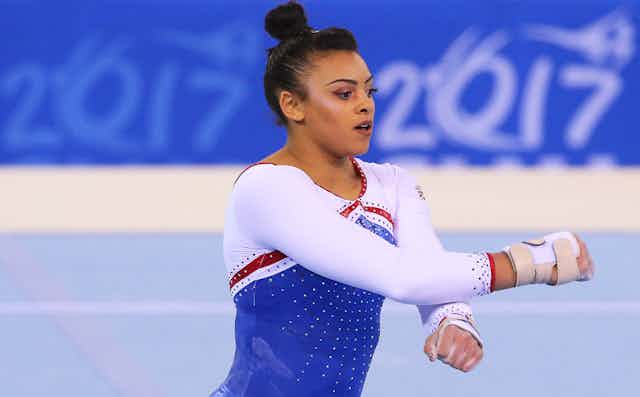In a moving letter on Twitter, top British gymnasts have reported that abuse in their sport is “completely normalised”. These athletes, including current Olympians and senior competitors, are uniting to speak out about the physical and psychological abuse they have experienced and witnessed in their sport.
Under the hashtag #GymnastAlliance, athletes have been sharing their stories. These include how the sport of gymnastics for many years has cultivated an “environment of fear and mental abuse” and many suggest that while welfare issues have been raised with British Gymnastics, they have not been taken seriously.
In high-performance environments, where athletes are fine-tuned to push themselves to physical and mental limits, abuse can go unnoticed or be deemed “what it takes” to reach the highest levels of performance. British gymnasts report that the abuse is so common that it is accepted by athletes, parents and coaches.
In our sport, abuse is normal
The culture of winning and criteria for success have created a cycle that perpetuates abusive practices, portraying them as acceptable and, at times, necessary within gymnastics.
Athletes are revered for their physical attributes, such as strength, speed and stamina, as well as their psychological strength or mental toughness to cope with the demands of elite sport. British gymnasts suggest that this relentless culture leaves athletes with little choice other than to accept that they should ignore pain, play through injuries, and do whatever it takes in pursuit of success – ideas often instilled from a young age.
When children and their families gain access to elite “expertise”, they know many others are waiting to take their place. This can encourage compliance: continued selection in these systems means accepting “how things are done”.
Because success is so desired, when it is achieved, uncompromising coaching practices in abusive coach-athlete relationships may be re-imagined as effective coaching, with success only deemed possible because of those practices.
For instance, there is a lot of focus on looks and weight and how having the “right” body equates to success. This has created practices, such as daily weighing, that promote harmful bodily expectations, which can crush self-esteem and promote eating disorders.
British gymnasts have referred to the fear of “rocking the boat” and the need to remain silent to avoid deselection, resulting in athletes who are afraid to speak out because of the consequences it may have on their careers.
Even if they do gain the confidence to speak out athletes may not be taken seriously, with their voices being censored, shutdown or ignored.
A lasting impact
While there is an immediate cost associated with abuse, there is also a lasting and potential lifelong impact. Many of the gymnasts reported having chronic injuries that they will never recover from due to over-use and training or competing through the pain. British gymnast sisters, Becky and Ellie Downie shared how exposure to abusive climates in their sport has had an overwhelming impact. Ellie noted:
The never-ending focus about my weight will leave scars which will never be healed, I suspect.
Through these stories, it becomes clear that the impact of abuse lasts long after an athlete has stopped competing.
While the spotlight has been shone on the failures and abuses that have occurred in British Gymnastics, it is not the only sport guilty of enacting psychological and physical harm upon its athletes.
These allegations are set against a backdrop of global patterns of physical, psychological and sexual abuse in sport identified across the media and academic research. Media reportage concerning cultures of fear, intimidation and bullying in high-performance settings are increasingly common. Recently Korean triathlete, Choi Suk-Hyeon took her own life as a result of the years of violence she endured as an international athlete. Findings consistently demonstrate the presence of abuse at all levels ranging from community through to high-performance sport.
As former Paralympic gold medallist Baroness Grey-Thompson stated, after leading a year-long duty of care review:
Recent media reports and anecdotal evidence from across a range of sports has led to questions about whether welfare and safety really are being given the priority they deserve.
Questions are being asked about the price being paid for success. It is clear that the drive for success and desire to win should not be at the cost of the individuals involved.
Making sporting spaces safe
The stories from elite gymnasts are a stark reminder of the presence of organisational tolerance for abuse and what happens when winning must happen at any cost. In the UK, the compromise of athlete health is clearly a step too far in the “no compromise” approach to medal table success.
When a coach is shouting insults at, belittling or physically harming an athlete, it is abuse and an infringement of their human rights. We encourage athletes and parents to speak out, as these gymnasts have done, as an important step in breaking the cycle.
Elite sport often strives for the Olympic motto in which athletes become faster, higher and stronger. We need the same dedication toward safety, welfare and protection for all.

